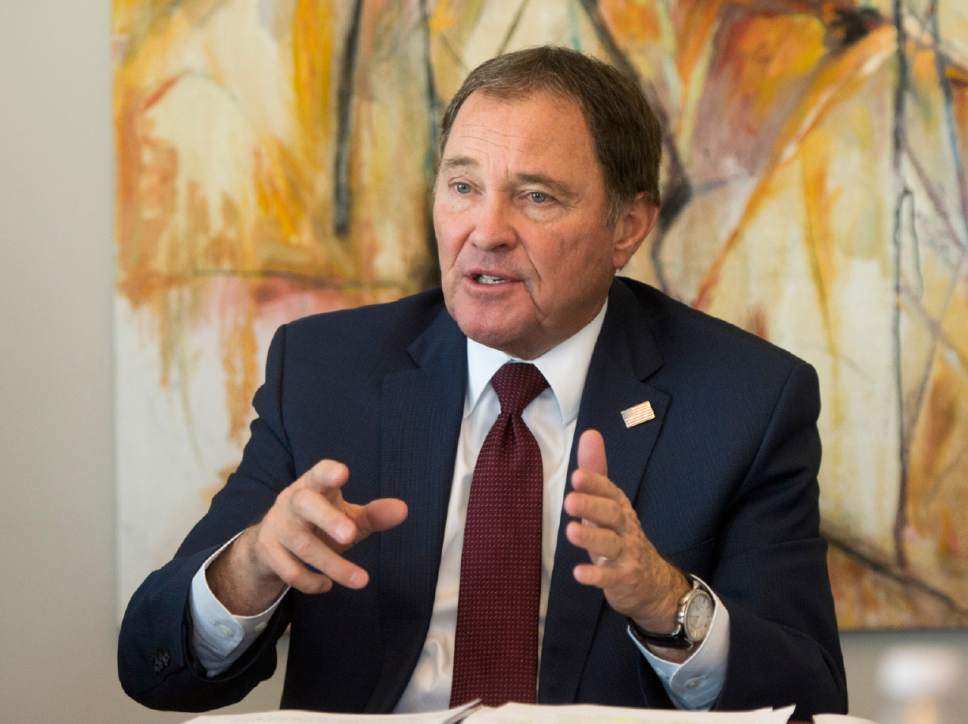This is an archived article that was published on sltrib.com in 2017, and information in the article may be outdated. It is provided only for personal research purposes and may not be reprinted.
Gov. Gary Herbert sought Thursday to throw water on an intensifying fight with the Legislature over the legality of his plan to quickly elect a replacement for outgoing Rep. Jason Chaffetz.
"Emotions are probably a little high here, and we need to count to 10 and think methodically about what is good policy," he said at his monthly news conference on KUED.
"I don't want this to overshadow the fact that we get along very well with the Legislature and create good policy," he said, including passing about 500 bills a year, most with little opposition and few vetoes.
While the two sides strongly disagree on the special election process Herbert imposed, "it doesn't mean we are enemies," he said. "It means we have a difference of opinion, and we're protecting our turf."
That comes after lawmakers this week held a joint caucus of House Republicans and Democrats to outline how the election process may not survive legal challenges and accused Herbert of bullying Attorney General Sean Reyes into not releasing a legal opinion they think may validate their concerns.
The governor imposed a condensed timeline — one lawmakers contend required legislative approval. They also said he legally should have waited to start the election clock until after Chaffetz leaves office June 30, not before.
Herbert stood firm.
"We are on very solid legal footing," the governor said Thursday. He said he took pains to "mirror what is already on the books as far as the election process."
He refused to call the Legislature into a special session to spell out the special election rules, he said, because the only proposal he heard from lawmakers "was an alternative to what we have on the books today, which is a pretty good process."
Legislative leaders wanted to discard the current ability of candidates to qualify for a primary election by seeking signatures, according to Herbert. He said they also wanted to avoid the possibility of a primary election by allowing party conventions to select nominees.
Under that scenario, former conservative state lawmaker Chris Herrod, who won at the GOP convention, would be the nominee. Instead, Republican voters will have a choice from among three candidates: Herrod, Provo Mayor John Curtis and investment adviser Tanner Ainge, son of Boston Celtics general manager Danny Ainge.
The governor said short-circuiting the primary would "disenfranchise about 190,000 registered Republicans who would like to have a say on who their next congressperson would be."
He added, "We know from historical precedent that whoever is the Republican nominee, chances are is going to be the elected official in November and chances are will be there for a long time…. It was important to me, at least, that the voice of the people be heard."
The winner of the GOP primary will go on to face Democrat Kathie Allen, a physician, in the November final election.
Herbert said several states have started — and even completed — special elections to replace House members before they officially left office. He said his office received approval for that from the U.S. Department of Justice and U.S. House Speaker Paul Ryan, R-Wis.
Herbert denied assertions by legislators that his office threatened ethics sanctions — even loss of law licenses — against lawyers in the Utah attorney general's office if they released the legal opinion prepared at the request of legislative leaders.
"That's patently false," he said. "There's not been any threat to anybody. There's not been anybody's license threatened."
The governor said his office sought to protect attorney-client privilege after the Legislature talked about possible lawsuits against him. He likened it to a University of Utah football coach talking to a Brigham Young University coach about his philosophy on strategy.
"If you're not going to play against each other, that may be an OK thing to do," he said. "But if you are going to have a game this Saturday, it would not be probably a very appropriate and proper thing to do. You're conflicted out."
Herbert said he doubts the lawsuit filed by the new United Utah Party threatens to overturn the special election. Party leaders say the complaint is focused on getting the organization and its candidate, Jim Bennett, certified to appear on the ballot — it's not intended to get into the middle of the fight between the governor and Legislature.
Herbert said the question of Bennett's candidacy on the new party ticket now will be up to a judge.
"If the courts say he's qualified and there is time enough to put him on the ballot in November," Herbert said, "I have no problem with that. But we will follow the law in the executive branch."



